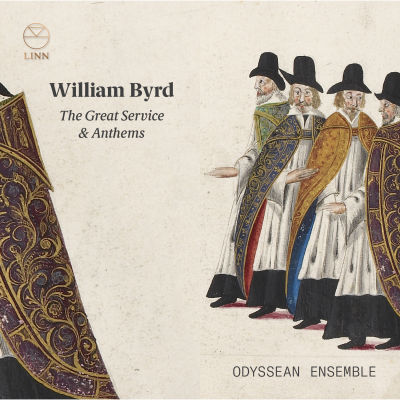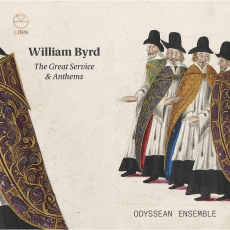Byrd: The Great Service & Anthems (Bonus Tracks)
Byrd: The Great Service & Anthems (Bonus Tracks)
Choose quality
Studio Master (192) FLAC
- Studio Master (192) ALAC
- Studio Master FLAC
- Studio Master ALAC
- CD Quality FLAC
- CD Quality ALAC
- MP3
- Sentence: I Will Goe to My FatherArtist(s) David Suchet
Sentence: I Will Goe to My Father
00:18$0.00 - Lesson: And David Spake the WordsArtist(s) David Suchet
Lesson: And David Spake the Words
07:37$0.00 - Lesson: And Paul Earnestly Beholding the CouncellArtist(s) David Suchet
Lesson: And Paul Earnestly Beholding the Councell
06:46$0.00 - Prayer and Thankesgiving for the Happy Deliverance of His MajestieArtist(s) David Suchet
Prayer and Thankesgiving for the Happy Deliverance of His Majestie
03:50$0.00 - Sentence: I Exhort You ThereforeArtist(s) David Suchet
Sentence: I Exhort You Therefore
00:28$0.00 - Lesson: After the Death of MosesArtist(s) David Suchet
Lesson: After the Death of Moses
04:34$0.00 - Lesson: Let Every Soule Be Subject Unto the Higher PowersArtist(s) David Suchet
Lesson: Let Every Soule Be Subject Unto the Higher Powers
03:24$0.00 - Collect: Almighty God and Heavenly FatherArtist(s) David Suchet
Collect: Almighty God and Heavenly Father
01:41$0.00
Total running time: 28 minutes.
Album information
This is a free accompanying recording to Byrd: The Great Service & Anthems, featuring readings by the actor David Suchet.
This free download includes contemporary readings from the Book of Common Prayer which Odyssean Ensemble has recorded alongside its recording of The Great Service as a way of transporting the listener back to the period when this piece was written, and placing this rich and colourful music in an historical context. The texts are drawn from the now defunct Services for Deliverance from the Gunpowder plot in 1605 and the Accession of the James I to the throne, both of which would have been events where Byrd’s music might have been heard, and which he may even have attended.
If you have the CD and wish to rip yourself a digital copy and add these readings to appreciate the full historical context, please re-order as per this list:
1. Sentence I will goe to my Father
2. The Great Service: Venite
3. Lesson And David spake the words
4. The Great Service: Te Deum
5. Lesson And Paul earnestly beholding the councell
6. The Great Service: Benedictus
7. Prayer and Thankesgiving for the happy deliverance of his Majestie
8. O God, the proud are risen against me
9. The Great Service: Creed
10. Fantasia, BK 62
11. Sentence I exhort you therefore
12. Sing joyfully
13. Lesson After the death of Moses
14. The Great Service: Magnificat
15. Lesson Let every soule be subject unto the higher powers
16. The Great Service: Nunc dimittis
17. Collect Almighty God and heavenly Father
18. Exalt thyself, O God
Andrew Johnstone explains the significance of these readings and their place in The Great Service:
As a transforming influence on national culture, the English Reformation both gave and took away. On one hand, through the vernacular media of the Bible and the Book of Common Prayer it laid down a corpus of resonant prose that would ring in the ears of the faithful for centuries to come. On the other hand, it saw the abolition of certain festivals, notably St George’s Day and Corpus Christi, which for generations had been occasions for public holidays, mystery plays and processions.
The successors to these ‘popish’ festivities were centred not on saints and sacraments but on the monarchy, the anniversary of the sovereign’s accession being marked from the 1570s by church bells and Services of thanksgiving. As well as causing his own Accession Day to be celebrated in the manner established by Elizabeth I, James I soon instituted a second annual commemoration, Gunpowder Treason Day, which would be enacted in churches until 1859 and has lived on in the social celebration of Guy Fawkes Night.
Always focal points for anti-Catholic rhetoric, not to say diatribe, the new thanksgivings took on the mantle of traditional religious festivals by being appointed with proper psalms, readings and prayers that were first published as appendixes to the Prayer Book and later integrated into it. To any who dared think themselves capable, like William Byrd, of remaining publicly loyal to the Crown whilst compromising privately on matters of religion, these royal liturgies were stern admonitions to think again.

